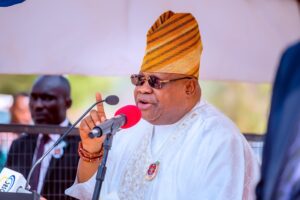Constitutional Alteration Bills: Buhari’s attempt at restructuring
[ad_1]
LEON USIGBE analyses the signing into law of 16 Constitution Alteration Bills by President MuhammaduBuhari against the backdrop of agitation for the country’s restructuring.
On Friday, the presidency announced that President Muhammadu had assented to 19 bills, 16 of them being constitutional alterations of the 1999 constitution of the Federal Republic of Nigeria (as amended). The action is in furtherance of Section 58 (4) of the Constitution and falls within his oft-repeated response to restructuring agitators that the initiative is better achieved through the legislature.
One of the bills ensures that the railway is removed from the exclusive legislative list to the concurrent list, making it possible for states to regulate and invest in the infrastructure. But some of the significant highlights of the assented Constitutional Alteration Bills include, giving financial independence of State Houses of Assembly and State Judiciary, regulating of the first session and inauguration of members-elect of the National and State Houses of Assembly and for related matters; and ensuring that the President and Governors submit the names of persons nominated as Ministers or Commissioners within 60 days of taking the oath of office for confirmation by the Senate or State House of Assembly; and for related matters.
Other highlights are: granting the powers to states to generate, transmit, and distribute electricity in areas covered by the national grid; and for related matters; excluding the period of intervening events in the computation of time for determining pre-election matters petitions, etc; regulating the first session and inauguration of members-elect of National and State Assemblies; changing prisons to correctional service and re-designating correctional service in the concurrent list.
By signing the bills into law, the president has engendered a paradigm shift in some key areas of national life. For instance, the Judiciary, both at the federal and state levels, is now financially independent, quitting the monetary apron strings of governments at their levels forever. Experts say this financial autonomy should guarantee their independence and make them more fearless in the dispensation of justice. Despite that, the fact that the appointment of Justices and judges must still be approved by the president of governors even though on the recommendation of the National Judicial Council (NJC), suggests that the last hurdle to full and comprehensive autonomy for the Judiciary will remain.
What the president has also done in signing the alteration bills is also to break the monopoly of the federal government in electricity generation, transmission and distribution. The new law provides that states can perform these functions in areas covered by the national grid. Against the struggle of the federal government to ensure a stable supply of electricity, states with the wherewithal can now invest in power infrastructure and regulate them in a way that will meet the power supply needs of their people. The hope is that as new players innovate and invest in the sector, it may come with productive efficiency that will have a positive bearing on electricity cost for consumers who will now have more choices. But on the flip side, it is feared that such investments may just be a duplication of efforts.
The same goes for railway, which has now moved from the exclusive legislative list to the concurrent list with the signing of the Alteration Bill. The implication is that states are now able to also make laws to regulate the establishment and operation of rail services in their lands even though the federal government retains the sole responsibility for inter-state railway.
Officials in the Buhari administration hail the signing into law the 16 Constitution Alteration Bills as a genuine effort at restructuring the country, which has been an agitation by a large section of the population.
The constitution alteration bills originally passed by the National Assembly also included financial autonomy for local governments that would have seen the discontinuation of the controversial State Joint Local Government Accounts. It failed, because the number of states that passed the amendment in their legislatures unfortunately did not meet the constitutional threshold.
Beyond that, the bills signed into law also recorded another landmark in the sense that it changed the names of some local government areas in the country. It is impossible to create new local government areas or alter the names of existing ones as contained in the constitution without first invoking the amendment process of the body of fundamental principles according to which Nigeria is governed.
So, with the National Assembly passing the bill and obtaining the nod of the requisite number of state legislatures, the assent to the bill by the president has changed the names of some local governments listed in the Constitution. Egbado North and Egbado South Local Government Areas in Ogun State are now to be formally called Yewa North and Yewa South, respectively, just as Afikpo North and Afikpo South local government areas in Ebonyi State have been renamed Afikpo and Edda local government areas, respectively.
What President Buhari has done seems to vindicate his position that the much-vaunted restructuring of the country can be achieved within the framework of standard legislative Constitution amendment.
Though the constitution alteration may not have succeeded in all that it set out to do, notwithstanding the doubts and hesitance that bogged the process, the signing of the 16 bills will be seen as a positive outcome in the journey to create a more equitable and efficient Nigerian society.
READ ALSO FROM NIGERIAN TRIBUNE
[ad_2]














Post Comment